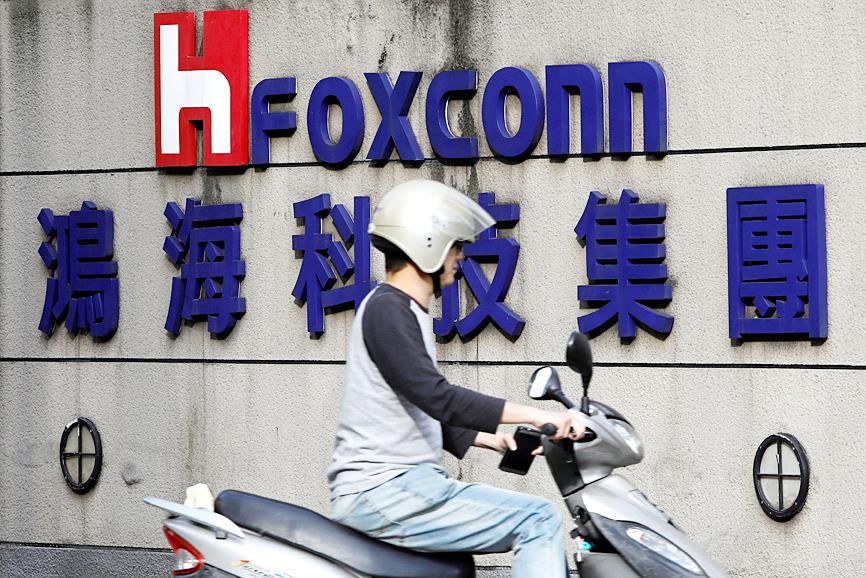Hon Hai Precision Industry Co (鴻海精密) plans to assemble key components for Google servers at its plant in Wisconsin, people familiar with the matter said, finally breathing life into a factory that US President Donald Trump hailed as crucial to bringing manufacturing back to the US.
The company has decided to locate production for this new contract at the existing complex rather than make the components at home or in China, the people said, asking not to be identified.
The under-utilized plant should start mass production in the first quarter, timed with the release of Intel Corp’s Ice Lake server chips, they said.

Photo: Tyrone Siu, Reuters
Hon Hai is setting up surface-mount technology assembly lines that it would use to place semiconductors onto circuit boards, they added.
Hon Hai, known internationally as Foxconn Technology Group (富士康科技集團), is one of several Taiwanese firms exploring ways to expand in the US and lessen a reliance on Chinese production bases.
The company has also sought to diversify a business that counts on Apple Inc for half of its revenue, including by courting more US clients.
On Thursday last week, Taiwan Semiconductor Manufacturing Co (台積電) won city-level incentives for a US$12 billion chip plant in Phoenix, another step toward bringing high-tech manufacture back to the US and addressing security concerns over the industry’s supply chain.
A Hon Hai representative said that it is developing data center infrastructure and high-performance computing “capabilities” in Wisconsin, but declined to name any customers.
Taiwan counts Washington as an essential diplomatic, economic and military ally amid rising tensions with Beijing.
Hon Hai, which operates most of its factories in central and southern China, won Google’s business because it was the only contract manufacturer capable of establishing a surface-mount technology line on US soil, one of the people said.
Shanghai-listed Foxconn Industrial Internet Co (富士康工業互聯網), its cloud business unit, would oversee the server business in Wisconsin, another person familiar with Foxconn’s operations said.
Once envisioned as the centerpiece of a “Made in USA” effort that would create 13,000 jobs for Wisconsin, the plant instead succumbed to delays and switched direction several times after local officials slashed subsidies.
Hon Hai missed its first-year hiring target by a wide margin, ending 2018 with just 178 full-time employees. This year, rather than the promised large display panels, it began churning out masks and ventilators.
Yet its location in the heart of the US is a boon to Alphabet Inc’s Google, which is trying to win lucrative contracts for its server-dependent cloud business. The US company considers it an important area for the company’s growth, but one in which Amazon.com Inc and Microsoft Corp dominate.
A base in the US could help Hon Hai court US government contracts, particularly as Washington ramps up scrutiny over a largely Chinese-focused global electronics supply chain.

Real estate agent and property developer JSL Construction & Development Co (愛山林) led the average compensation rankings among companies listed on the Taiwan Stock Exchange (TWSE) last year, while contract chipmaker Taiwan Semiconductor Manufacturing Co (TSMC, 台積電) finished 14th. JSL Construction paid its employees total average compensation of NT$4.78 million (US$159,701), down 13.5 percent from a year earlier, but still ahead of the most profitable listed tech giants, including TSMC, TWSE data showed. Last year, the average compensation (which includes salary, overtime, bonuses and allowances) paid by TSMC rose 21.6 percent to reach about NT$3.33 million, lifting its ranking by 10 notches

SEASONAL WEAKNESS: The combined revenue of the top 10 foundries fell 5.4%, but rush orders and China’s subsidies partially offset slowing demand Taiwan Semiconductor Manufacturing Co (TSMC, 台積電) further solidified its dominance in the global wafer foundry business in the first quarter of this year, remaining far ahead of its closest rival, Samsung Electronics Co, TrendForce Corp (集邦科技) said yesterday. TSMC posted US$25.52 billion in sales in the January-to-March period, down 5 percent from the previous quarter, but its market share rose from 67.1 percent the previous quarter to 67.6 percent, TrendForce said in a report. While smartphone-related wafer shipments declined in the first quarter due to seasonal factors, solid demand for artificial intelligence (AI) and high-performance computing (HPC) devices and urgent TV-related orders

Prices of gasoline and diesel products at domestic fuel stations are this week to rise NT$0.2 and NT$0.3 per liter respectively, after international crude oil prices increased last week, CPC Corp, Taiwan (台灣中油) and Formosa Petrochemical Corp (台塑石化) said yesterday. International crude oil prices last week snapped a two-week losing streak as the geopolitical situation between Russia and Ukraine turned increasingly tense, CPC said in a statement. News that some oil production facilities in Alberta, Canada, were shut down due to wildfires and that US-Iran nuclear talks made no progress also helped push oil prices to a significant weekly gain, Formosa said

MINERAL DIPLOMACY: The Chinese commerce ministry said it approved applications for the export of rare earths in a move that could help ease US-China trade tensions Chinese Vice Premier He Lifeng (何立峰) is today to meet a US delegation for talks in the UK, Beijing announced on Saturday amid a fragile truce in the trade dispute between the two powers. He is to visit the UK from yesterday to Friday at the invitation of the British government, the Chinese Ministry of Foreign Affairs said in a statement. He and US representatives are to cochair the first meeting of the US-China economic and trade consultation mechanism, it said. US President Donald Trump on Friday announced that a new round of trade talks with China would start in London beginning today,